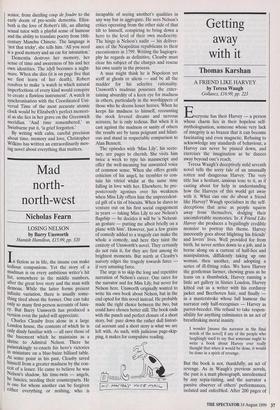Mad
north-
Nicholas Fearn
LOSING NELSON by Barry Unsworth Hamish Hamilton, £15.99, pp. 320 In fiction as in life, the insane can make tedious companions. Yet the story of a madman is on every ambitious writer's hit list, somewhere in the middle numbers, after the great love story and the man with demons. While the latter forms present infinite variation, there is usually some- thing tired about the former. One can take Only so many first-person accounts of luna- cy. But Barry Unsworth has produced a version even the jaded will appreciate. Charles Cleasby lives alone in a large London house, the contents of which he is only dimly familiar with — all save those of the basement which he maintains as a shrine to Admiral Nelson. There he Painstakingly re-enacts his hero's victories in miniature on a blue-baize billiard table. At some point in his past, Cleasby saved himself from a greater madness by the con- ceit of a lesser. He came to believe he was Nelson's shadow, his time-twin — angels, he fancies, needing their counterparts. He is one for whom another can be forgiven either everything or nothing, who is incapable of seeing another's qualities in any way but in aggregate. He sees Nelson's critics operating from the other side of that tilt to himself, conspiring to bring down a hero to the level of their own mediocrity. The hinge is Nelson's nadir — his deliver- ance of the Neapolitan republicans to their executioners in 1799. Writing the hagiogra- phy he regards as definitive, Cleasby must clear his subject of the charges and rescue his own sanity in the process.
A man might think he is Napoleon yet scoff at ghosts or aliens — and be all the madder for his selective rationality. Unsworth's madman possesses the enter- taining absurdity of a keen eye for madness in others, particularly in the worshippers of those who he deems lesser heroes. When he keeps his madness to himself, recounting the stock fevered dreams and nervous seizures, he is only tedious. But when it is cast against the madness or sanity of others the results are by turns poignant and hilari- ous and stand in respectable comparison to Alan Bennett.
The episodes with 'Miss Lily', his secre- tary, are pages to cherish. She visits him twice a week to type his manuscript and offer the well-meaning but unwanted voice of common sense. When she offers gentle criticism of his angel, he trembles to con- tain his vitriol whilst at the same time falling in love with her. Elsewhere, he pre- posterously agonises over his weakness when Miss Lily offers him the unprecedent- ed gift of a tin of biscuits. When he dares to venture out on his first social engagement in years — taking Miss Lily to see Nelson's flagship — he decides it will be 'a Nelsoni- an gesture — putting me albeit briefly on a plane with him'. However, just a few grains of comedy added to a tragedy can make the whole a comedy, and here they taint the entirety of Unsworth's novel. They certainly do not ruin it, for they are first among its brightest moments. But mirth at Cleasby's naivety edges the tragedy towards farce if very amusing farce.
The urge is to skip the long and repetitive narration of Nelson's career. One cares for the narrator and for Miss Lily, but never for Nelson here. Unsworth originally wanted to write his own book about Nelson, but in the end opted for this novel instead. He probably made the right choice between the two, but could have chosen better still. The book ends with the punch and perfect closure of a short story, but pare down the rather dull histori- cal account and a short story is what we are left with. As such, with judicious page-skip- ping, it makes for compulsive reading.


























































 Previous page
Previous page